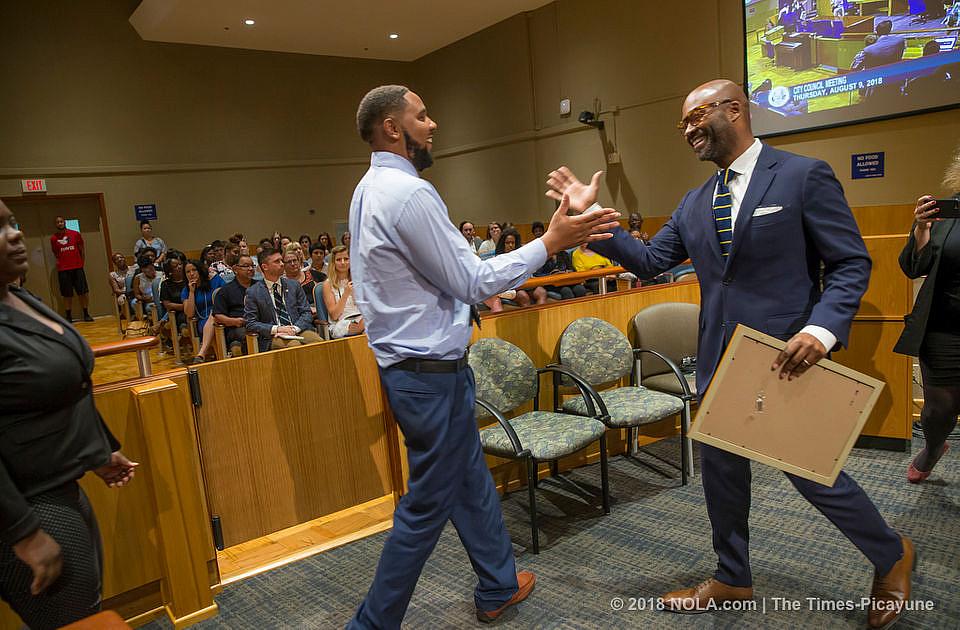New Orleans City Council calls for increase in trauma services for children
This story was produced as part of a project for the Dennis A. Hunt Fund for Health Journalism, a program of the USC Annenberg Center for Health Journalism.
Read related stories in this series here.

Photo by Chris Granger, NOLA.com | The Times-Picayune
The New Orleans City Council on Thursday (Aug. 9) unanimously approved a resolution calling for a comprehensive, citywide approach to the prevention, intervention and treatment of childhood trauma.
The resolution asks the New Orleans Children and Youth Planning Board to present to the council -- no later than Aug. 1, 2019 -- recommendations to increase mental healthcare services for children, as well as the identification of new streams of revenue to pay for those services, and changes to city policy and laws required to implement its recommendations.
"This council is going to keep talking about trauma until it is front of mind for every single person in this community, because it is going to create a different 300 years," said Councilman Jason Williams, who co-sponsored the resolution with Councilmembers Helena Moreno and Jay Banks.
Williams then turned to the packed council chambers and asked the people who came to support trauma-informed services for children to stand. The majority of those in attendance took to their feet.
"Often times, when we talk about children's issues in this chamber it is completely empty," Williams said, looking at the standing audience members. "This is very impressive. It is very hopeful for the children of this city."
The coach of the team, Edgarson Shawn Scott, appeared before the council along with his wife, Domisheka Hankton, and assistant coach, Michael Quinn. Scott said he was a "kid in trauma," growing up poor in the Magnolia housing development, one of five kids born to a mother addicted to drugs.
"I lost my brother, I lost my friends, I lost my cousin, all to gun violence. That played a big part in my life," Scott said. "I was scared to go to school. I ain't go to funerals. I was really afraid. I know what trauma is. I been through trauma."
That's why Scott and Hankton organized the Panthers football team, he said, to give the boys in his neighborhood the support he so desperately needed but was absent from his own childhood.
"I started this coaching to give the kids an opportunity ... to give love back to them because I knew in the streets there is no love," Scott said. "I'm their guardian for the few hours they're with me."
After Scott's presentation, representatives with the Louisiana Center for Children's Rights, the Institute of Women and Ethnic Studies, and Children's Bureau of New Orleans painted for the council a dire picture of the current state of mental healthcare for children in New Orleans.
Paulette Carter, president and CEO of Children's Bureau, said, "It is with a mixture of pride, sadness and humility that I report that in 2017-18 Children's Bureau provided clinical treatment services to nearly 1,000 children in this community." She followed by saying that figure represents a small percentage of those in need and that their continued ability to provide those services is threatened by annual state budget cuts to mental healthcare services and the lowest Medicaid reimbursement rates in the country.
This prompted Councilman Joseph Giarrusso to offer that, at the age of 36, he lost his father to depression.
Thursday's resolution calls for the Children and Youth Planning Board to:
- Recommend ways in which existing systems - such as the Orleans Parish School Board and Metropolitan Human Services District -- can collaborate to better address trauma. Currently, many of these systems operate independently and without coordination.
- Recommend ways to expand therapeutic services that help children cope with the effects of trauma.
- Recommend ways to expand preventative services, such as "early education programs, mentoring and recreation programs."
- Find ways to increase funding for these services, including shifting existing resources.
The Children Youth and Planning Board was created by state law to assist in the development of services that encourage positive youth development and diversion from the criminal justice and foster care systems.
Scientific research has shown that early exposure to traumatic events such as violence and poverty can alter the way children's brains work, increasing their aggression and impulsiveness, and decreasing their ability to remember information, develop empathy and build self-esteem. This trauma, if unrecognized and untreated, can lead to expulsion from school and juvenile incarceration, perpetuating the cycle of violence and poverty.
Trauma has also been shown to increase the risk of heart disease, diabetes, obesity and mental illness.
"We are going to continue to keep the focus on this to make sure that our city is a trauma-informed city."
[This story was originally published by The Times-Picayune]
